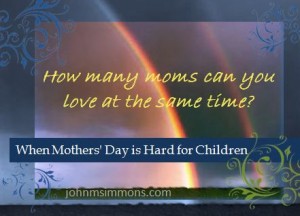When Mothers’ Day is Hard for Children
My adopted daughters struggle with all of the conflicting feelings that come with a Mothers’ Day fraught with memories of a birth mother who brutally abused them, but whom they still love. The kids have been on edge for the past week. They cry easier. They fight (more than usual). Sometimes they just find a quiet corner (not an easy feat in our house) and draw inward.
I’ll admit, I had to turn to Google for an answer on where the apostrophe goes in Mother(’)s(’) Day. Anna Jarvis, the founder of Mother’s Day insisted on the singular possessive (apostrophe between the r and the s) as in; It’s my mother’s day, not all mothers’ day. It’s a sweet thought. Reality isn’t always as cleanly deciphered in a realm where the phrase “Real Mother” makes no sense. In our house the apostrophe definitely comes after the “s.” We have more than one mom to honor. To my adopted children, that seems awkward. I don’t know if it’s from society’s portrayal of “normalcy,” or if it’s instinctive that no one should ever have such bad luck that they need a second mother. Regardless of the reasons, it was time for our Mothers’ Day pep talk.
Me: “Hey girls, how many mothers do you have?” There followed an awkward pause as my daughters looked at Amy. “Come on, we’ve had this talk lots of times. Mom knows. She doesn’t have a problem with it. How many?”
Who is your favorite parent?
Sarah (14), while fixing her eyes on the floor, whispers: “Two.” Celeste (11) was only two when she was removed from her first home. She has no memories of her first mother. She happily responds: “I have three, because Mama Olga (the name she always uses for the director of her orphanage) took care of me in the orphanage.” Sarah continues to look at the floor, as does Annie (22) whose mental disability dissuades her from participating much in a discussion like this, though she will listen and learn from what is said. (We’ll talk to Annie, again, separately.)
Me: “How many brothers and sisters do you have?” There are varying responses. Someone adds a sister who was so damaged that she couldn’t leave Russia. Someone else adds her, plus two biological siblings whose whereabouts we have never been able to uncover. “Okay. How many brothers and sisters can you love?”
Sarah looks up quizzically while responding. “All of them?” Me: “Right.” Celeste: “Maybe up to five hundred.” I shudder. Like nine kids in our house wasn’t enough. Still, I know we’d have included the others in our family had it been possible. Even so, and knowing the habits of former parents, I really, really hope there aren’t five hundred of them.
“Alright,” I continue, “how many aunts and uncles can you love?” Annie: “Ahvolum.” Me: “Right, Annie. All-of-them.”
Me: “Celeste, how many boyfriends or girlfriends should we love at one time? How many husbands or wives?” Celeste, with conviction: “Only one.” Sarah and Annie nod.
Me: “How many moms and dads can you love at the same time?” Again, there is an awkward pause. Is it instinctual? In our family we have always acknowledged birth parents and encouraged love for them. Sarah: “Al- all- all of them?” Amy: “Yes! Of course!”
A loving, non-threatened mother talked to her daughters about feelings not being right or wrong.
“Okay,” I respond. “Now it gets harder. Sarah; who is your favorite sibling?” I’ll cut her off if she starts to say the name I already know has flashed through her mind, but Sarah is sharp. I’m pretty confident.
She begins hesitatingly and finishes strong. “I do have favorites… but I’m not going to say.”
“Good, Sarah! Is it anybody’s business who your favorite sibling is?” Sarah: “No.” Amy: “Is that an appropriate question for Dad, or for anyone else to ask?” Sarah, more sharply; “No.” Me: “Oh, it’s going to get worse…”
Me: “Who is your favorite parent?”
Sarah blurts out: “Nooooo!” Amy gives me the look.
I love my children enough to wish that they had never had to endure the pain of the situations that made their adoptions the best solution.
“You’re right, Sarah. It is alright to have favorites and it is nobody’s business who your favorite is.”
Amy took over for the rest of the conversation. Maybe my shock approach was effective, but it didn’t need to go further. A loving, non-threatened mother talked to her daughters about feelings not being right or wrong; about rights to have our feelings and how no one should feel guilty for having feelings. She told them it was okay to have happy feelings, angry feelings, scared feelings; all kinds of feelings, and that they could even have all of those feelings at the same time.
As I watched my incredible wife talk with my daughters, I realized how thankful I am that they have a mother who doesn’t need them to validate her; who knows that adoption is about her children, not about her. I’m sure that some of my children will always struggle with adoption, and to us, as parents, that is only natural. I love my children enough to wish that they had never had to endure the pain of the situations that made their adoptions the best solution.
Now, if you have been fortunate enough to be able to say “Mother’s Day,” count your blessings. Enjoy your family and that wonderful day. If you are like us, and “Mothers’ Day” is more accurate, know that you have friends who understand. We hope that your happy feelings on this coming Sunday (or whenever Mother’s Day is, where you are) outweigh the ones that bring sad tears.
If your mother is already in heaven, here is Amy’s gift to you.
More blog articles by John M. Simmons about Adoption.

